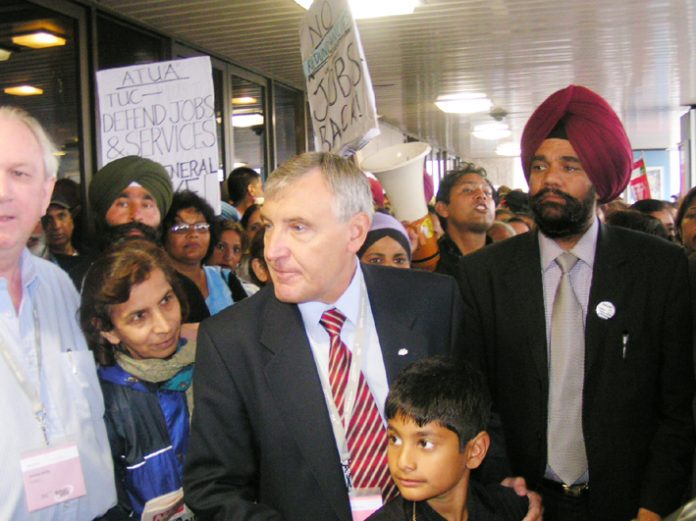
AMERICA’S largest manufacturing company, General Motors (GM), announced on Monday that its losses were $1.6bn in the three months to the end of September, bringing the total for this year to $4bn.
Chief Executive Rick Wagoner revealed that the corporation has a survival plan in which it will sell off its finance subsidiary GM Acceptance Corps, axe 25,000 jobs in the US by 2008 and cut $1bn from the $6bn it spends every year on workers’ healthcare.
Wagoner was able to announce the huge cut in healthcare payments after clinching a deal with the leadership of the United Auto Workers (UAW) union, late on Sunday night. The GM Chief Executive declared enthusiastically: ‘This is a very big step forward that we will build on.’
UAW leaders, President Ron Gettelfinger and Vice-President Richard Shoemaker, issued a statement saying: ‘The tentative agreement on health care matters is the result of an in-depth analysis of GM’s financial situation and many weeks of intense discussion between the UAW and GM.
‘We believe it is clearly in the best interests of UAW GM active workers, retirees and their families. The tentative agreement is subject to finalised language, ratification by UAW-GM members and court approval.’
GM is the largest private healthcare provider in the US, with 750,000 workers, pensioners and their dependents reliant on its healthcare payments, which are expected to be $6bn this year.
In the US, families have to buy health insurance to ensure treatment, or have employment contracts, like that at GM, through which they and their employers pay for health cover. However, only 60 per cent of businesses provide healthcare insurance for employees.
About 45 million people have no health insurance and only get rudimentary care through means-tested Federal Medicaid and Medicare programmes. Under President George Bush, the number of people with no insurance has gone up and his administration is slashing funds for Medicaid and Medicare.
So what GM is doing is not only devastating for its 750,000 workers, pensioners and their families, it is of immediate importance for all carworkers and the whole US working class.
The two other American car giants, Ford and Daimler-Chrysler, are already demanding that the UAW leadership make similar concessions to them.
The UAW leaders’ sell-out over the level of healthcare coverage at GM takes place as they negotiate with the bankrupt Delphi car components company, which wants to slash wages and benefits by two thirds.
What the UAW members at GM and Delphi face is not only the bosses’ attacks on jobs, wages and healthcare cover, they confront a crisis of leadership in their trade union. The UAW bureaucracy is both unable and unwilling to defend past gains made by workers through their union.
This characterises, in general, the situation throughout the US trade union movement. Recently the Farmer Jack grocery chain got union agreement for a 10-per-cent pay cut and at the bankrupt NorthWest Airlines striking International Association of Machinists (IAM) members are fighting a 26-per-cent pay cut.
When huge corporations are declared bankrupt, or announce losses running into billions, the bosses, like Delphi chief Robert S Miller, say ‘globalisation has swept over them’.
In this situation, the union leaders in the AFL-CIO unions and the breakaway Change to Win Coalition, who deliver militant speeches about building ‘strong trade union organisation’, capitulate to the bosses and sell out. As the UAW leadership says, it engaged in ‘in-depth analysis of GM’s financial situation’, found it was losing billions and accepted attacks on healthcare.
It is clear that workers must build a new political leadership in the unions, which organises to stop sackings and cuts in pay and healthcare benefits, and defeats the capitalist corporations’ threats by organising workers’ control of bankrupt industries, in preparation for their nationalisation.
Such a revolutionary, socialist leadership, a section of the Trotskyist International Committee of the Fourth International, must fight to break the trade unions from the Democrats and Republicans, the parties of the big corporations, and build a Labor Party to stand candidates in elections.
This leadership has the task of organising the US working class to carry out the American Socialist Revolution, through which it will bring in a workers’ government, guaranteeing jobs, decent living standards and free universal health care for every working-class family.
